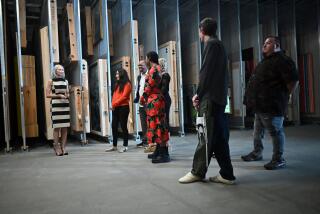Sweatshop Exhibition Planned at Smithsonian
- Share via
Re “Plan for Sweatshop Exhibition Draws Fire,” Sept. 11:
The Smithsonian Institution is an educational institution that strives to make American history accessible, useful and meaningful to the millions who view our exhibitions, read our catalogs and participate in our public programs. It occasionally presents difficult, unpleasant, or controversial historical episodes, not out of any desire to embarrass, to be unpatriotic, or to cause pain, but out of a responsibility to convey a fuller, more inclusive history. By examining historical incidents ripe with complexities and ambiguities, we hope to stimulate greater understanding and appreciation for the historical forces and choices that shaped America. Ultimately, the Smithsonian Institution mounts these kinds of exhibitions because we have confidence in the American public’s desire for candor and appreciation for important historical stories.
The exhibition, “Between a Rock and a Hard Place: A Dialogue on American Sweatshops, 1820-Present,” scheduled to open April 15, 1998, will be a balanced presentation, both in the historical material it presents and the outside views and participation it will include. We have sought to include the voices of participants on all sides of this issue. Our exhibition will be strong in scholarship, but, equally, it will be sensitive to participants’ concerns. We will continue to reach out to all interested parties, including the manufacturing, apparel and retail sectors, to ensure a fair and balanced presentation.
I. MICHAEL HEYMAN
Secretary, Smithsonian Institution
Washington
The apparel industry trade groups claim that their position could not be heard in an exhibit like the one proposed for the Smithsonian. Perhaps they are right, but I would be very interested to hear their position on sweatshops in light of the following facts:
The slave conditions at El Monte are a matter of public record.
One of the largest garment manufacturers in Southern California, Guess Inc., is currently scrambling to defend itself against charges in a class-action lawsuit that minimum wage and overtime violations are rampant in their contractors’ sweatshops. Guess Inc. has been removed from a Department of Labor trendsetters list because of recidivism in its “fight” against wage-and-hour violations. Sweatshop conditions appear to be the cornerstone of the apparel industry rather than “a few bad apples.”
EVAN SMYTH
Los Angeles
More to Read
The biggest entertainment stories
Get our big stories about Hollywood, film, television, music, arts, culture and more right in your inbox as soon as they publish.
You may occasionally receive promotional content from the Los Angeles Times.










